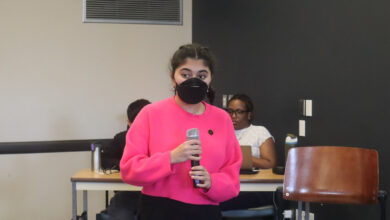 Supplied - Alberto G
Supplied - Alberto GExam time wasn’t always a philosophical shit show for me.
When I was 18 and in my first year of Engineering, my mindset come midterms was straightforward: memorize the steps to solve the induction question for calculus, cram as many microscopic formulas as possible onto the 8.5” by 11” sheet of paper for physics, and somehow find a way to convince my prof that I could solve problems with some fucking thing called a force-couple system in mechanics. I did the work, wrote the tests, and waited for my grades.
When I moved on from Eng, my class names changed — physics became finance and algebra became accounting — but the way I handled tests didn’t. Profs threw definitions, formulas, practice problems, and theories my way and I would furiously write notes, cram my brain full of the most important info, and spew it all out when it came time to write the exam.
It was a fool proof system — hell, I was nearly a 4.0 student! I was the multiple choice maestro, the part-mark marvel, the “fuck it, I’ll just guess and still get it right” guru. In the game of university testing, I knew all the rules and I was winning.
But my champion’s spirit wouldn’t last. The party ended the instant I realized the truth about my examination domination: I had written all these tests, but I hadn’t learned a damn thing.
Each semester would bring with it a barrage of quizzes, lab exams, midterms, and finals. And in every individual case I would know the material and get a good grade. But a month would pass, the next round of exams would approach, or the summer would fly by and nearly everything I busted my ass to remember and expertly recall on each exam would be long forgotten.
The system of learning around me, the one I believed I understood and conquered, felt broken and hollow of purpose. Now when I sat down to study, trying to read and memorize my way through hundreds of PowerPoint slides or work through countless back-of-the-book practice problems, I couldn’t help but think, what’s the point?
On one hand, I can see the reality of the situation: hundreds of students will register in a single course and there is no better evaluation option for the university than to administer periodic exams. But as one of the students who has to study for and write them, it’s hard not to feel discouraged by the insignificance your efforts seem to have on your long term learning.
[pullquote align=”full” cite=”” link=”” color=”” class=”” size=””] “fuck it, I’ll just guess and still get it right.” [/pullquote]Adding to the frustration, many instructors are aware of the limitations of testing as a learning tool and will address them, albeit discreetly, during their first day spiels. They will plead with students to “understand” their material, not just regurgitate it for exams — well aware that for the most part, a test evaluates little more than an individual’s memorization and cramming abilities. Many assign out-of-class readings to complement their lectures, offer office hours, help sessions, and tutoring options to encourage students to embrace deeper, more permanent learning. As noble as this is, as a student in a class of 400, reading a new set of notes from a projector each day while dividing your time between five other lectures and labs (not to mention while also trying to have a life outside of the classroom), having time to truly grasp concepts beyond what’s needed for your nearest exam is nearly impossible.
It’s painfully clear now that I’m 23 and in my sixth year of university that the system I once thrived in, which relies on exams as a measure of students’ learning, may be functional but is unquestionably flawed. That being said, exams aren’t going anywhere anytime soon and neither am I. So what’s a guy to do?
I have nine classes left and likely over double the number of exams to write before I graduate into a world where potential employers, investors and intelligent consumers expect far more than the ability to test well in their future employees/investments/business partners. So, the onus falls on me to step the fuck up and learn something on my own terms for once and not on those of convenience derived by the institution around me.
Join a club, apply to a work experience or internship program, look into courses that focus on research or paper writing, take fewer courses per semester, or simply talk to your professors about better ways to engage in the material you want to learn beyond the pages of their exams. The solution to my mid-degree midterm crisis might not be the same as yours. But take it from a soured sixth year: it can be found. Just don’t expect the university to find it for you.




